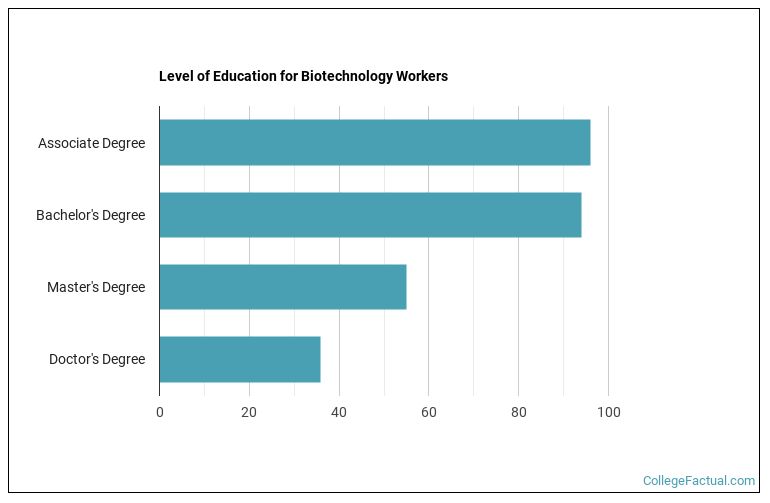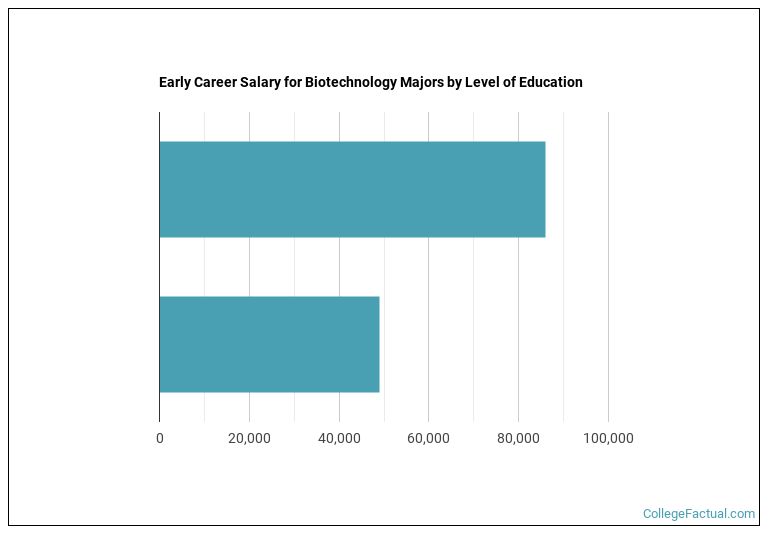 by our College Data Analytics Team
by our College Data Analytics TeamBiotechnology is a mix between biology, chemistry, biochemistry, molecular biology, and engineering. This fun and interesting major allows you to "tinker" with living organisms (in a good way, not a mad scientist kind of way). You'll be able to use what you've learned from your classes to create better and more advanced products like growth hormones, vaccines, and medicines.
Some of the classes you will take include: biochemistry, biology, cell biology, evolution, botany, genetics, immunology, zoology, virology, organic chemistry, microbiology, entomology, human heredity, and plant pathology. This mix of diverse classes will teach you how to analyze everything from a human heart to a blade of grass. This major is relatively new and constantly changing in order to keep up with technological advancements. You will learn how to exploit and alter genes and genetic processes. This major is made for the curious student who wants to know the makeup of every living thing.
In 2021-2022, biotechnology was the 174th most popular major nationwide with 4,245 degrees awarded. This year's Best Biotechnology Schools ranking compares 63 of them to identify the best overall programs in the country. Explore this or one of our many other custom biotech rankings further below.
Curiosity is the most important personality trait you should have. A desire to know and understand the way living things grow, adapt and survive will help you tremendously in this major. You will be taking classes in a broad variety of disciplines. Attending lectures will teach you theories that you will be able to practice in the lab, and then apply to real-life scenarios in your future career. Be prepared to spend a great deal of time in the lab performing research, doing experiments and recording your findings.
A love for technology will also help you succeed. You will be confronted with new technology constantly in this major, as well as your future career. Constant learning and adaptation will allow you to keep up with the changes.
Although this major requires independent thought and research, you will also be taught to work with others through group projects. Work on your communication skills in order to collaborate with lab partners and peers. You may also have the opportunity to work with a professor or advisor to complete an independent research project. Learn to communicate professionally and clearly both orally and in writing.
A high school diploma or equivalent is typically required for most biotech degree programs and many students will need a minimum GPA and SAT/ACT score depending on the school. In addition to these basic biotechnology program qualifications, to serve in some biotech careers, special certification may be required outside of your degree.
There are many different biotech degree levels. You can get anything from a in biotechnology to the highest biotech degree, a . How long it takes to complete some common biotech degree levels is shown below.
| Degree | Credit Requirements | Typical Program Length |
|---|---|---|
| Associate Degree | 60-70 credits | 2 years |
| Bachelor’s Degree | 120 credits | 4 years |
| Master’s Degree | 50-70 credits | 1-3 years |
| Doctorate | Program required coursework including thesis or dissertation | At least 4 years |
A bachelor's degree is the most common level of education achieved by those in careers related to biotech, with approximately 36.7% of workers getting one. People currently working in careers related to biotech tend obtained the following education levels.
| Level of Education | Percentage of Workers |
|---|---|
| Bachelor’s Degree | 35.6% |
| Doctoral Degree | 19.9% |
| Master’s Degree | 18.8% |
| Post-Doctoral Training | 17.0% |
| Associate’s Degree (or other 2-year degree) | 2.4% |
About 55.0% of workers in careers related to biotech obtain at least master's degrees. See the chart below for the most common degree level workers in biotechnology have received.

The education level required is different depending on the biotech career you are seeking.
This cutting edge major will prepare you for a variety of career fields. Many students go into graduate studies in scientific or medical fields. However, Biotechnology majors can also easily find work as a researcher for an environmental, medical, pharmaceutical, agricultural or genetic industry.
Graduates also find work as biologists, ecologists, environmental scientists, pharmaceutical sales representatives or marketing specialists, quality control analysts and crime lab technicians. This major is very broad allowing you to work in the area that interests you the most.
Want a job when you graduate with your biotech degree? Biotechnology careers are expected to grow 11.5% between 2016 and 2026.
The following options are some of the most in-demand careers related to biotechnology.
| Occupation Name | Projected Jobs | Expected Growth |
|---|---|---|
| Biological Science Professors | 71,700 | 15.1% |
| Natural Sciences Managers | 62,300 | 9.9% |
| Biological Scientists | 41,800 | 8.0% |
Recently graduated biotechnology students earned an average of $71,853 in <nil>. Earnings can range from as low as $34,308 to as high as $90,091. As you might expect, salaries for biotech graduates vary depending on the level of education that was acquired.

Salaries for biotechnology graduates can vary widely by the occupation you choose as well. The following table shows the top highest paying careers biotech grads often go into.
| Occupation Name | Median Average Salary |
|---|---|
| Natural Sciences Managers | $139,680 |
| Biological Science Professors | $97,340 |
| Biological Scientists | $83,600 |
With over 329 different biotech degree programs to choose from, finding the best fit for you can be a challenge. Fortunately you have come to the right place. We have analyzed all of these schools to come up with hundreds of unbiased biotech school rankings to help you with this.
One of 14 majors within the Biological & Biomedical Sciences area of study, Biotechnology has other similar majors worth exploring.
| Major | Annual Graduates |
|---|---|
| Biotechnology | 4,245 |
| Related Major | Annual Graduates |
|---|---|
| General Biology | 106,032 |
| Biochemistry, Biophysics & Molecular Biology | 14,558 |
| Neurobiology & Neurosciences | 12,616 |
| Physiology & Pathology Sciences | 9,568 |
| Ecology, Evolution & Systematics Biology | 7,935 |
Image Credit: By Henk Caspers/Naturalis Biodiversity Center under License More about our data sources and methodologies.